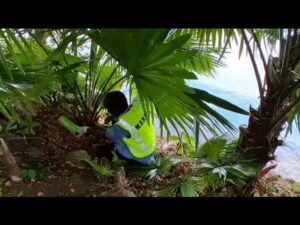
Wildcat warning
Veterinary expert warns health risk with smuggled ocelot
BLACK RIVER, St Elizabeth — The country’s leading veterinary expert is warning people here to be cautious if they spot an ocelot, a wildcat resembling a kitten, which escaped from the Hendriks Wharf after it was smuggled on a vessel with other animals.
Dr Sophia Ramlal, the director of veterinary services in the Ministry of Agriculture, Fisheries, and Mining, told the Jamaica Observer on Wednesday that the most concerning factor regarding the ocelot is the uncertainty about its health.
“In that regard what I am saying is we cannot currently verify the health status of this animal. We believe it to be a young animal almost looking like a kitten, but it is still a wild animal and should be treated with care, with caution, with compassion, and if spotted should be turned over. We should be notified. The Veterinary Services Division, the police National Environment and Planning Agency (NEPA), Jamaica Defence Force (JDF), anybody from the listed agencies should be notified that this ocelot has been spotted,” she said.
“It is advised not to be interacting with the ocelot, not to harm the ocelot, to treat it as a species we know we have not allowed entry to Jamaica, and so as a precaution to ensure that they are treating with it safely, but reporting it so we can come and collect it,” added Ramlal.
A press release from the JDF on Wednesday morning had mentioned that a tiger cub was among several animals smuggled into the country.
“It is not a cub… It is an ocelot, which is also a wildcat. It is not native to Jamaica and so, whereas it may not be the size of a tiger, it is a wild animal and should be treated with the same precaution as any other wild animal that is not native to Jamaica,” Dr Ramlal said.
According to the JDF, the coast guard intercepted a vessel off the south coast of Jamaica which was carrying four monkeys, 12 parrots, one tiger cub and a quantity of marijuana. However, during processing at Black River, the wild cat managed to escape containment and is now believed to be at large in the wider Black River area, the JDF said.
The Ministry of Agriculture, Fisheries and Mining in a press release also on Wednesday said none of the animals on the vessel were approved by the Veterinary Services Division for entry into Jamaica.
“Therefore, the health status of these animals and risk they may present are currently unknown. The Veterinary Services Division in collaboration with NEPA, Customs Enforcement Team, the Hope Zoo, the JDF and the Jamaica Constabulary Force have been actively managing this unfolding situation,” the ministry said.
“The ocelot in question is reported to be juvenile, approximately the size of a young domestic cat and with a dark, spotted coat. The public is advised to urgently report any sightings of the ocelot to the police, Veterinary Services Division, NEPA or the JDF and should not seek to harm or capture the animal. The ocelot should not be in the possession of any member of the public. It is not a pet and must be handed over to one of the listed agencies urgently immediately, both in the interest of public health and the welfare of the ocelot,” the ministry added.
As news spread on Wednesday that a smuggled wildcat was on the loose there were mixed reactions in Black River with the town’s leader urging residents not to capture the animal as a pet.
“No one has yet indicated that they have seen the [animal], so I am assuming that it is somewhere hiding, it is not used to this new environment,” Mayor of Black River Richard Solomon said on Wednesday afternoon.
“I am also appealing to residents that if it is that they identify the [animal] they reach out to the relevant authority whether the JDF or NEPA or the Jamaica Constabulary Force, so that the appropriate course of action can be taken to recapture the [animal],” he added.
Mayor Solomon said there was excitement among residents in Black River, but also fear for others that the wildcat was on the loose.
“I would want to say that it is a mixed mood, one where some people are excited as I can recall my staff seeing [the news] and were a bit excited and people saying they would take it home, as it is a cute [animal] posed on the [stock] photo that was posted. There are people who are scared and who are saying that [wild cats] are dangerous, but it is more a mood of excitement,” he said.
“We don’t know if the [animal] has any virus or bacteria that can be transmitted one way or the other. We have to be cautious. We don’t want to be exposed to something that we are not familiar with,” he added.
He is imploring residents to not harm the wildcat.
“Do not take action into your own hands. I heard people talking about terminating it, and I am saying, let us allow the relevant authority to handle it,” he said.
He commended the JDF for its efforts in protecting the country’s borders.
“I want to really commend the Jamaica Defence Force for the hard work in intercepting this vessel. When it comes to exotic species, animals or plants, smuggling it into a new environment can cause serious challenges for the space that it is introduced to, so oftentimes persons don’t understand the implications that it can carry,” he said.
“Parrots, for example, can carry a virus that can perhaps be introduced to our poultry industry that would be devastating. We have to be vigilant and ensure that, if it is that we are seeking to bring in any sort of exotic species, we do it the correct way following the rules and regulations,” he added.




















